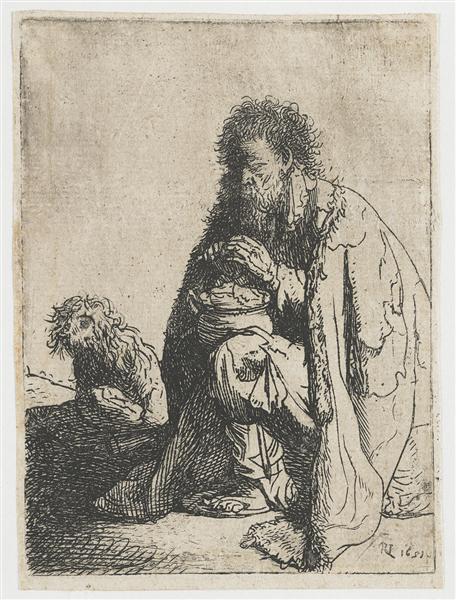Description
The work "Sitting Mendigo and her dog", painted by Rembrandt in 1629, is a fascinating illustration of technical skill and emotional depth that characterizes its creator, one of the most prominent masters of Baroque art. The painting, which portrays a beggar sitting with his dog, is a testimony of humanity and vulnerability, recurring themes in Rembrandt's work. The figure of the beggar, represented with a humble and torn attire, evokes a feeling of sadness and resignation. The use of light and shadow, a distinctive seal of Rembrandt's style, gives life to his face, highlighting the wrinkles and the expression of his gaze, which transmits a mixture of dignity and suffering.
In this work, Rembrandt also demonstrates its mastery in the representation of textures. The details of the beggar's clothes are particularly notable, where you can see the skillful use of the brush to create the illusion of worn tissue. The skin of both man and dog is worked with great touch sensitivity, which enriches the emotion of the scene. The presence of the dog, an element that provides both visual and narrative contrast, acts as a faithful mendigo partner, symbolizing loyalty in the midst of adversity.
The composition is deliberately simple but effective; The beggar is the central focus, located in a small space that accentuates its isolation. The dark and neutral background allows the spectator to concentrate on the forms and expressions of the figure, while the use of faint lights enhances the melancholic atmosphere. Rembrandt is known for its focus on lighting, and here it achieved a dramatic effect that highlights the humanity of its subject, moving away from the ideals of classical beauty to deepen the human condition.
The use of color is characterized by a dull and earthly palette, which reinforces the feeling of helplessness and, at the same time, provides a historical context at the time represented. Through brown, gray and subtle touches of light, Rembrandt manages not only to create a gloomy atmosphere, but also evoke a deep empathy in the viewer. This color palette favors the psycho-emotional study of the central figure, revealing a narrative that speaks of the economy and poverty in seventeenth-century society, but which, in turn, transcends the universality of the human condition.
"Sitting beggar and his dog" is, in a sense, a microcosm of Rembrandt's work. The mixed technique mixture, attention to detail and deep empathy for its characters are manifested in this work of art that, although apparently simple, reflects a deep understanding of human nature. Throughout his career, Rembrandt dedicated himself to exploring issues such as poverty, redemption and suffering, and this concrete work encapsulates those ideals in a touching way. Recognized as one of his first explorations on these issues, he is in the context of his evolution as a baroque artist and thinker, marking the beginning of a path that would lead him to become an icon in the history of art.
KUADROS ©, a famous paint on your wall.
Hand-made oil painting reproductions, with the quality of professional artists and the distinctive seal of KUADROS ©.
Reproduction service paintings With a guarantee of satisfaction. If you are not completely satisfied with the replica of your painting, we refund your money 100%.

